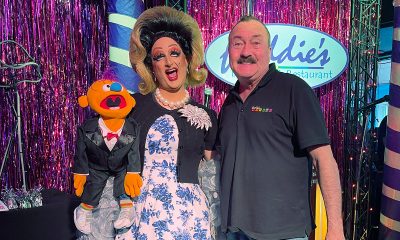Local
Christian conservatives ‘in driver’s seat’ in Va.
Dems consider lawsuit to force power-sharing as activists fear onslaught of anti-gay bills
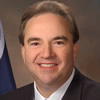
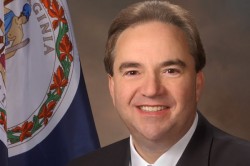
Virginia Lt. Gov. Bill Bolling would cast the deciding vote in any tie on bills coming up for a vote, effectively giving Republicans a razor-thin majority in the Senate. (Courtesy photo)
LGBT activists said they were hopeful that the threat of a lawsuit by Democratic members of the Virginia Senate this week would persuade Republicans to share control of the chamber and decrease the chance that it will enact anti-LGBT bills following the GOP gains in last week’s election.
No one disputes the fact that Republicans have gained a one-vote legislative majority in the Virginia Senate after Republican candidates defeated two incumbent Democrats in the 40-member Senate, resulting in a 20-20 split between the two parties.
Under the Virginia Constitution, the lieutenant governor — in this case Republican Bill Bolling — has authority to cast the deciding vote in any tie on bills coming up for a vote, effectively giving Republicans a razor-thin majority in the Senate.
ALSO IN THE BLADE: HOW DID LGBT CANDIDATES FARE IN VIRGINIA ON ELECTION NIGHT?
But Democrats argue that the constitution doesn’t give Bolling authority to vote on non-legislative matters, such as who should be named as chairs of the body’s powerful committees and which party should control the committees. Both sides say the matter could wind up in court if a compromise isn’t reached before the new legislative session begins in the second week of January.
Republicans increased their existing majority in the state’s House of Delegates in the Nov. 8 election. With Republican Robert McDonnell as governor, if Republicans win the dispute over who fully controls the Senate, the conservative-leaning GOP would be in control of all branches of the Virginia government for the first time since the Civil War.
“Virginia is never a place to look for gay-friendly legislation,” said Stephen Farnsworth, professor of political communications at George Mason University and a specialist in Virginia politics. “But what you’re looking at now is a Christian conservative element of the Republican Party that is very much in the driver’s seat going forward.”
Gay Democratic leaders and LGBT activists acknowledge that even if Democrats prevail on the issue of power sharing regarding Senate committees, the Republican majority for votes on legislation means that that the Senate is now far less likely to block anti-gay bills as it did when it was under Democratic control.
“We can certainly expect that there’s going to be a cascade of really unsavory bills flooding over to the Senate from the House as there have been in recent years pertaining to issues of immigration, women’s rights and obviously gay rights, too,” said Nick Benton, editor and publisher of the Falls Church News-Press and board member of LGBT Democrats of Virginia.
“And how many of those bills can be made to die in the Senate at this point becomes a much dicier situation,” Benton said. “There’s no guarantee at all that any of that stuff is going to be beaten back.”
Nearly all news media outlets, including the Washington Post, have reported since last week’s election that Lt. Gov. Bolling’s authority to break a tie vote in the Senate would extend to votes on committee and internal Senate organizational issues as well as votes on bills.
But some Democrats this week said they dispute Republicans’ contention that the lieutenant governor has the power to vote on non-legislative issues.
“Fundamentally, the question is whether under the Virginia Constitution he has the authority to vote on Senate organizational issues as contrasted to legislative matters, substantive matters,” said Claire Gastanaga, legislative counsel and chief lobbyist for Equality Virginia, a statewide LGBT advocacy group.
“I’m not ready to predict exactly what’s going to happen with respect to the issues that we care about,” she said. “We’ll be pursuing Equality Virginia’s agenda as we always have, and once the organizational decisions are made then we’ll know who we needed to be talking to.”
Since committees and their chairs decide which bills reach the Senate floor for a vote, a determination of which party controls the committees will play a key role in deciding which bills are passed, including a bill introduced in past years calling for banning adoptions by gay and lesbian parents.
Democrats note that when there was a similar 20-20 split between the two parties in the Senate in 1996 and 1997, party leaders worked out a power sharing agreement that enabled Republicans and Democrats to chair different committees.
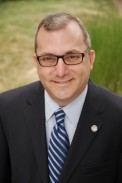
Newly elected Va. State Sen. Adam Ebbin said he plans to introduce a bill to bar employment discrimination against state employees based on sexual orientation and gender identity. (Photo courtesy Adam Ebbin)
House of Delegates member Adam Ebbin (D-Alexandria), the Virginia Legislature’s only openly gay member, won his race last week for a seat in the Virginia Senate, becoming the first out gay in that body.
ALSO IN THE BLADE: EBBIN’S MARCH TOWARD MAKING HISTORY
Ebbin said this week that he, too, is uncertain about the outcome of the dispute over whether Republicans will gain full control over the Senate committees or whether a power-sharing agreement will be reached. In either case, Ebbin said he plans to introduce a bill calling for banning employment discrimination against state employees based on sexual orientation and gender identity similar to the bill he introduced earlier this year.
The bill passed in the then Democratic-controlled Senate but died in committee in the GOP-controlled House.
Ebbin said he and LGBT allies in the Senate and House will do all they can to block anti-gay bills in the 2012 legislative session. But similar to Benton, Ebbin said the ability to block hostile bills will be more difficult under a GOP-controlled Senate.
“In the past, we’ve been able to count on the Senate to thwart anti-gay legislation passed by the House,” he said. “We can’t count on the Senate to do that in the next legislative session. I’m not saying that things won’t get killed in the Senate. It’s just that we can’t absolutely count on it.”
Ebbin said that in addition to a possible bill to ban gay adoptions, conservative GOP lawmakers could bring up other hostile bills that either surfaced or had been proposed in past years but died in committee. Among them were calls for banning Gay-Straight Alliance clubs in the state’s public schools and a call for banning colleges in the state from adopting non-discrimination polices related to sexual orientation and gender identity.
Ebbin said that although it would be unlikely, anti-gay groups might also attempt to persuade the legislature to repeal the only pro-gay bills it has ever passed – separate measures in 2005 and 2010 that removed an arcane state law that prohibited private insurance companies from selling health and life insurance policies to same-sex couples.
Farnsworth, the George Mason University professor, noted that virtually all Republican candidates in Virginia this year stressed economic and jobs-related issues along with their disagreements with the Obama administration over the economy. He said few if any of the GOP candidates raised social issues, such as gay rights, during their campaigns.
“It will be interesting to see just how the Republican unified government system operates in Virginia,” he said. “The lessons that Republicans have learned from the experiences in Wisconsin and Ohio and other places is that overreaching, offering up polarizing messages can be counterproductive.”
He added, “Careful Republicans with their eyes on the future may be hesitant to go too far in the conservative direction and risk a backlash.”
Are moderate Republicans the answer?
LGBT activists were hopeful that more moderate Republicans would join Sen. Tommy Norment (R-Williamsburg), the current minority leader who’s in line to become Republican majority leader. Norment was the only Republican in the Senate to vote for the state employment non-discrimination bill earlier this year when the Democratic-controlled Senate passed the measure.
Tiffany Joslyn, president of LGBT Democrats of Virginia, said she doubts that very many Republican lawmakers in the state would join Norment in backing LGBT supportive bills.
“I have no doubt they will do the same thing that they always do,” she said. “They preach moderation, they preach jobs, and then they get into office and they govern from the far right and to their far-right base.”
Joslyn called on Log Cabin Republicans of Virginia to join her group and Equality Virginia in urging more GOP lawmakers to support legislation seeking to bar LGBT discrimination in the workplace and in other areas.
Log Cabin Republicans of Virginia President David Lampo couldn’t be immediately reached this week. Christian Berle, deputy executive director of the national Log Cabin Republicans organization, said both the national and Virginia group would continue their ongoing efforts to encourage Republican lawmakers to support LGBT equality in all levels of government.
Berle also disputed predictions by gay Democrats that a GOP-controlled Virginia Legislature would result in the passage of anti-gay bills.
“They said the same thing would happen with Gov. McDonnell, that all kinds of bad things would happen,” said Berle. “It didn’t happen.”
He criticized Equality Virginia for taking the position that “only Democrats” could be counted on to support LGBT equality in the state and expressed concern that more LGBT advocates didn’t support gay Republican candidate Patrick Forrest’s race for a state Senate seat in the Northern Virginia city of Reston in this year’s election.
ALSO IN THE BLADE: IS VIRGINIA GAY REPUBLICAN SENATE CANDIDATE VICTIM OF GAY BAITING?
Gay Democrats said most LGBT activists didn’t support Forrest because he ran against incumbent Sen. Janet Howell, one of the LGBT community’s strongest allies in the Virginia Legislature.
District of Columbia
New D.C. LGBTQ+ bar Crush set to open April 19
An ‘all-inclusive entertainment haven,’ with dance floor, roof deck

D.C.’s newest LGBTQ+ bar called Crush is scheduled to open for business at 4 p.m. on Friday, April 19, in a spacious, two-story building with a dance floor and roof deck at 2007 14th St., N.W. in one of the city’s bustling nightlife areas.
A statement released by co-owners Stephen Rutgers and Mark Rutstein earlier this year says the new bar will provide an atmosphere that blends “nostalgia with contemporary nightlife” in a building that was home to a popular music store and radio supply shop.
Rutgers said the opening comes one day after Crush received final approval of its liquor license that was transferred from the Owl Room, a bar that operated in the same building before closing Dec. 31 of last year. The official opening also comes three days after Crush hosted a pre-opening reception for family, friends, and community members on Tuesday, April 16.
Among those attending, Rutgers said, were officials with several prominent local LGBTQ organizations, including officials with the DC Center for the LGBTQ Community, which is located across the street from Crush in the city’s Reeves Center municipal building. Also attending were Japer Bowles, director of the Mayor’s Office of LGBTQ Affairs, and Salah Czapary, director of the Mayor’s Office of Nightlife and Culture.
Rutgers said Crush plans to hold a grand opening event in a few weeks after he, Rutstein and the bar’s employees become settled into their newly opened operations.
“Step into a venue where inclusivity isn’t just a promise but a vibrant reality,” a statement posted on the Crush website says. “Imagine an all-inclusive entertainment haven where diversity isn’t just celebrated, it’s embraced as the very heartbeat of our venue,” the statement says. “Welcome to a place where love knows no bounds, and the only color or preference that matters is the vibrant tapestry of humanity itself. Welcome to Crush.”
The website says Crush will be open Tuesdays and Wednesdays from 4 p.m. to 12 a.m., Thursdays from 4 p.m. to 2 a.m., Fridays from 4 p.m. to 3 a.m., Saturdays from 2 p.m. to 3 a.m., and Sundays from 2 p.m. to 12 a.m. It will be closed on Mondays.
Crush is located less than two blocks from the U Street Metro station.
District of Columbia
Reenactment of first gay rights picket at White House draws interest of tourists
LGBTQ activists carry signs from historic 1965 protest

About 30 LGBTQ activists formed a circular picket line in front of the White House Wednesday afternoon, April 17, carrying signs calling for an end to discrimination against “homosexuals” in a reenactment of the first gay rights protest at the White House that took place 59 years earlier on April 17, 1965.
Crowds of tourists looked on with interest as the activists walked back and forth in silence in front of the White House fence on Pennsylvania Avenue. Like the 1965 event, several of the men were dressed in suits and ties and the women in dresses in keeping with a 1960s era dress code policy for protests of the Mattachine Society of Washington, D.C., the city’s first gay rights group that organized the 1965 event.
Wednesday’s reenactment was organized by D.C.’s Rainbow History Project, which made it clear that the event was not intended as a protest against President Joe Biden and his administration, which the group praised as a strong supporter of LGBTQ rights.
“I think this was an amazing event,” said Vincent Slatt, the Rainbow History Project official who led efforts to put on the event. “We had twice as many that we had hoped for that came today,” he said.
“It was so great to see a reenactment and so great to see how far we’ve come,” Slatt said. “And also, the acknowledgement of what else we still need to do.”
Slatt said participants in the event who were not carrying picket signs handed out literature explaining the purpose of the event.
A flier handed out by participants noted that among the demands of the protesters at the 1965 event were to end the ban on homosexuals from working in the federal government, an end to the ban on gays serving in the military, an end to the denial of security clearances for gays, and an end of the government’s refusal to meet with the LGBTQ community.
“The other thing that I think is really, really moving is some of the gay staff inside the White House found out this was happening and came out to greet us,” Slatt said. He noted that this highlighted how much has changed since 1965, when then President Lyndon Johnson’s White House refused to respond to a letter sent to Johnson from the Mattachine Society explaining its grievances.
“So now to have gay people in the White House coming out to give us their respects and to say hello was especially meaningful to us,” Slatt said. “That was not expected today.”
Among those walking the picket line was longtime D.C. LGBTQ rights advocate Paul Kuntzler, who is the only known surviving person who was among the White House picketers at the April 1965 event. Kuntzler said he proudly carried a newly printed version of the sign at Wednesday’s reenactment event that he carried during the 1965 protest. It stated, “Fifteen Million Homosexuals Protest Federal Treatment.”
Also participating in the event was Japer Bowles, director of D.C. Mayor Muriel Bowser’s Office of LGBTQ Affairs. Bowles presented Slatt with a proclamation issued by Bowser declaring April 17, 2024, Mattachine Society Day in Washington, D.C.
“Whereas, on April 17, 1965, the Mattachine Society of Washington courageously held the nation’s inaugural picket for gay rights, a seminal moment in the ongoing struggle for LGBTQIA+ equality in the United States, marking the genesis of public demonstrations advocating for those rights and paving the way for Pride Marches and Pride celebrations worldwide,” the proclamation states.
About 30 minutes after the reenactment event began, uniformed Secret Service agents informed Slatt that due to a security issue the picketers would have to move off the sidewalk in front of the White House and resume the picketing across the street on the sidewalk in front of Lafayette Park. When asked by the Washington Blade what the security issue was about, one of the Secret Service officers said he did not have any further details other than that his superiors informed him that the White House sidewalk would have to be temporarily cleared of all people.
Participants in the event quickly resumed their picket line on the sidewalk in front of Lafayette Park for another 30 minutes or so in keeping with the 1965 picketing event, which lasted for one hour, from 4:20 p.m. to 5:20 p.m., according to Rainbow History Project’s research into the 1965 event.
Although the LGBTQ picketers continued their procession in silence, a separate protest in Lafayette Park a short distance from the LGBTQ picketers included speakers shouting through amplified speakers. The protest was against the government of Saudi Arabia and organized by a Muslim group called Al Baqee Organization.
A statement released by the Rainbow History Project says the reenactment event, among other things, was a tribute to D.C.-area lesbian rights advocate Lilli Vincenz, who participated in the 1965 White House picketing, and D.C. gay rights pioneer Frank Kameny, who founded the Mattachine Society of Washington in the early 1960s and was the lead organizer of the 1965 White House protest. Kameny died in 2011 and Vincenz died in 2023.
The picket signs carried by participants in the reenactment event, which were reproduced from the 1965 event, had these messages:
• “DISCRIMINATION Against Homosexuals is as immoral as Discrimination Against Negroes and Jews;”
• “Government Should Combat Prejudice NOT PROMOTE IT”
• “White House Refuses Replies to Our Letters, AFRAID OF US?
• “HOMOSEXUALS Died for their Country, Too”
• “First Class Citizenship for HOMOSEXUALS”
• “Sexual Preference is Irrelevant to Employment”
• “Fifteen Million U.S. Homosexuals Protest Federal Treatment”
District of Columbia
Organizers announce details for D.C. Black Pride 2024
Most events to take place Memorial Day weekend at Westin Downtown
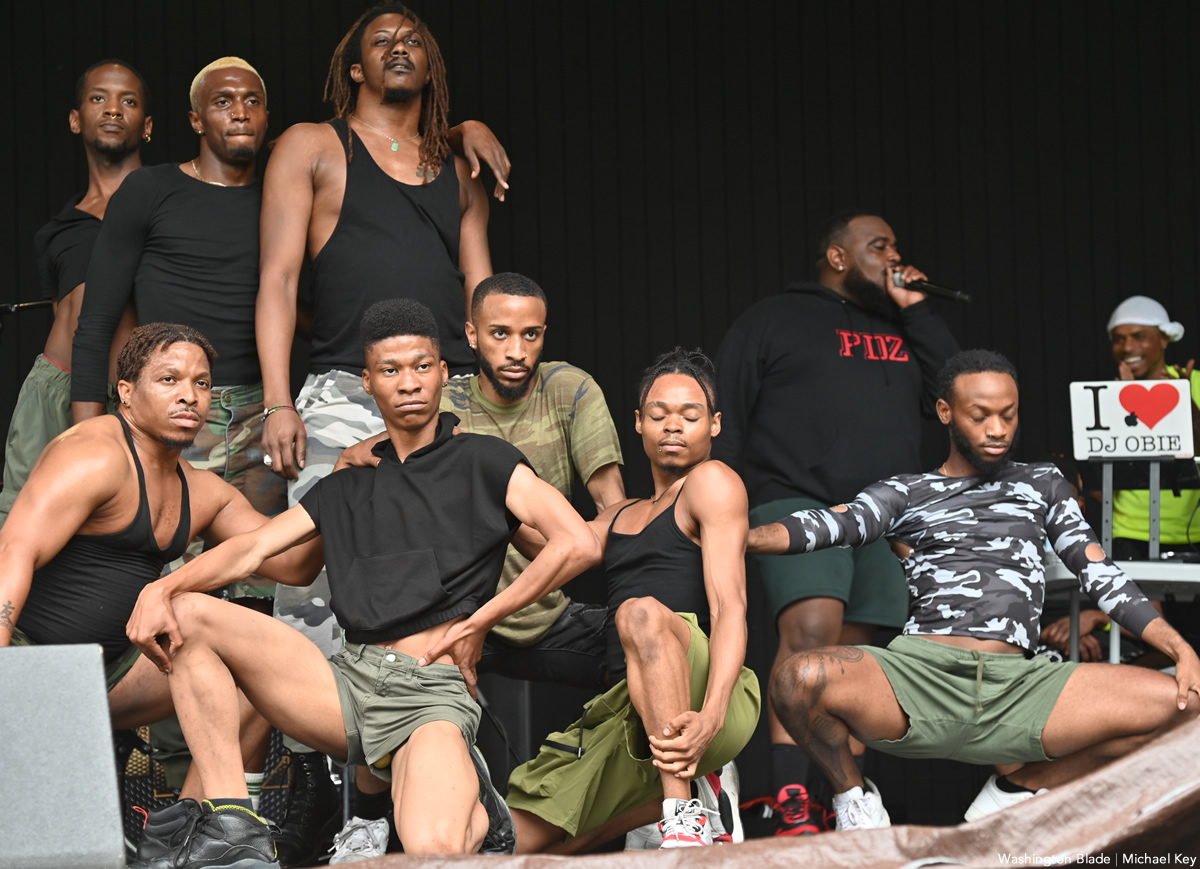
The Center for Black Equity, the organizer of D.C. Black Pride, the nation’s first and one of the largest annual African-American LGBTQ Pride celebrations, announced this year’s event will take place Memorial Day Weekend from May 24-27.
The announcement, released April 16, says that most 2024 D.C. Black Pride events will take place at the Westin Washington, D.C. Downtown Hotel at 999 9th St, N.W.
“With the theme Black Pride Forever, the event promises a weekend filled with vibrant celebrations, empowering workshops, and a deep exploration of Black LGBTQIA+ history and culture,” the announcement says.
It says events will include as in past years a “Rainbow Row” vendor expo at the hotel featuring “organizations and vendors created for and by the LGBTQIA+ community” offering products and services “that celebrate Black excellence.”
According to the announcement, other events include a Health and Wellness Festival that will offer workshops, demonstrations, and activities focused on “holistic well-being;” a Mary Bowman Poetry Slam “showcasing the power and beauty of spoken word by Black LGBTQIA+ artists;” the Black Pride Through the Decades Party, that will celebrate the “rich history of the Black LGBTQIA+ movement;” and an Empowerment Through Knowledge series of workshops that “delve into various topics relevant to the Black LGBTQIA+ community.”
Also, as in past years, this year’s D.C. Black Pride will feature its “Opening Night Extravaganza” reception and party that will include entertainment and live performances.
The announcement notes that D.C.’s annual Black Pride celebration, started in 1991 as a one-day outdoor event at Howard University’s Banneker Field, has inspired annual Black LGBTQ Pride events across the United States and in Canada, United Kingdom, Brazil, Africa, and the Caribbean. More than 300,000 people attend Black LGBTQ Pride events each year worldwide, the announcement says.
Full details, including the official schedule of events, can be accessed at dcblackpride.org.
-

 Africa4 days ago
Africa4 days agoCongolese lawmaker introduces anti-homosexuality bill
-

 District of Columbia19 hours ago
District of Columbia19 hours agoReenactment of first gay rights picket at White House draws interest of tourists
-

 World4 days ago
World4 days agoOut in the World: LGBTQ news from Europe and Asia
-

 Arizona23 hours ago
Arizona23 hours agoAriz. governor vetoes anti-transgender, Ten Commandments bill





